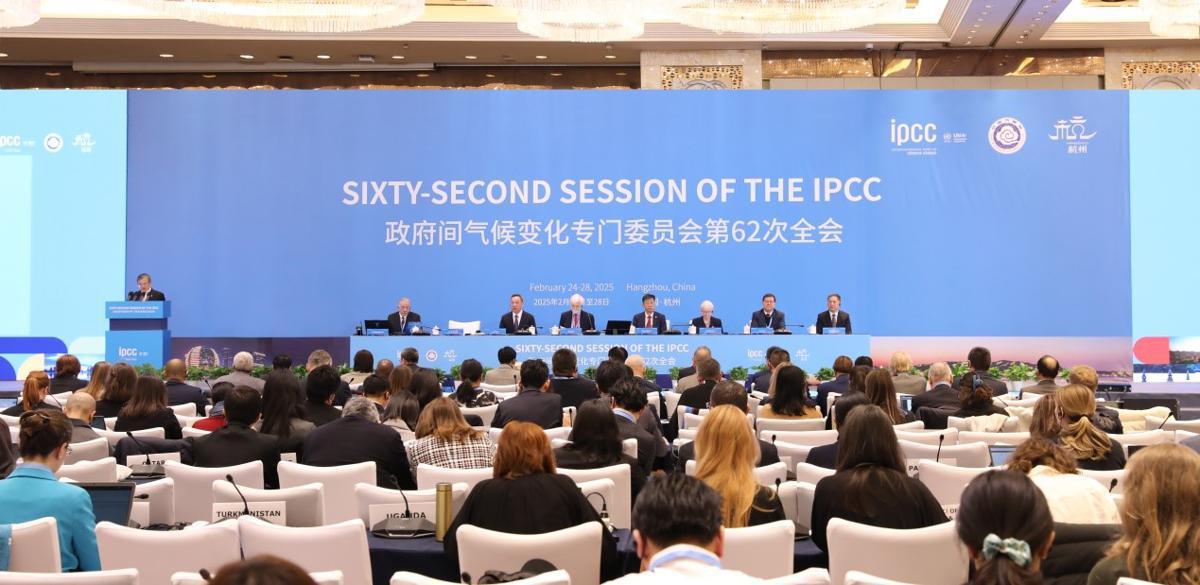
The 62nd plenary session of the IPCC opens in Hangzhou, the capital of Zhejiang province, on Monday. [Photo provided to chinadaily.com.cn]
Science-based policies and crucial contributions from countries like China were highlighted as key to the global fight against climate change at the 62nd plenary session of the Intergovernmental Panel on Climate Change (IPCC), which opened on Monday in Hangzhou, the capital of Zhejiang province.
The week-long event will see participants from more than 130 countries, observer organizations and international organizations gather together to consider the draft outlines of the three Working Group contributions of the IPCC Seventh Assessment Report and the Methodology Report on the Carbon Dioxide Removal Technologies, and Carbon Capture Utilization and Storage.
This meeting marks the first time China has hosted an IPCC plenary session.
"Driven by the IPCC's continuous efforts to deepen the scientific assessment process on climate change, China, as a developing country, has played an active role in advancing a comprehensive assessment of climate change and making a great effort on green and low-carbon transformation while balancing high-quality development with high-level security," said Chen Zhenlin, head of the China Meteorological Administration, at the opening session.
"Remarkable progress and rapid development have been achieved in harnessing renewable climate resources such as wind, solar and hydro energy," said Chen.
Statistics released in January by China's National Energy Administration show that the nation's installed solar power capacity reached 890 million kilowatts, and wind power capacity rose to 520 million kilowatts, a 45-percent and 18-percent year-on-year growth, respectively.
"China has consistently been an active participant and contributor to global climate action," said Liu Zhenmin, China's special envoy for climate change. "It remains steadfast in its commitment to advancing the goals of achieving carbon peak before 2030 and carbon neutrality before 2060."
He praised the critical role that the IPCC has played over the years in tackling climate change, saying that IPCC reports reflect a deepening understanding of climate science, driving the advancement of global climate change response efforts.
"These reports have become a vital scientific foundation for constantly strengthening and improving global climate governance," Liu said.
Established in 1988 by the World Meteorological Organization (WMO) and the United Nations Environment Programme, the IPCC provides governments at all levels with scientific information to formulate policies on climate change.
"This is a pivotal session for the delivery of the IPCC's Seventh Assessment Report," said IPCC Chair Jim Skea.
The WMO has confirmed that 2024 was the warmest year on record.
"It is evident that our timely, policy-relevant and actionable assessment reports have never been more pertinent," he said.
"I would venture to say it will be soon that every one of us will know somebody who has been affected by an extreme event like severe flooding or extreme heat," warned Ko Barrett, deputy secretary-general of the WMO.
China has made great contributions to the distribution of knowledge for climate science.
"For many decades, the government of China has demonstrated a strong commitment to international scientific cooperation and has been an important leader within the IPCC, providing research advances and helping to guide their highly influential assessments," Barret said.
According to the China Meteorological Administration, over 100 Chinese authors have helped draft IPCC reports, and more than 1,000 Chinese experts have been involved in their review process.